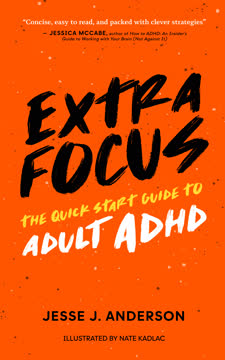Key Takeaways
1. ADHD is more than just attention deficit and hyperactivity
Rather than characterizing those with ADHD as having an attention deficit, it would be far more accurate to say they have a dysregulation of attention.
Attention dysregulation. People with ADHD don't lack attention; they struggle to regulate it. They often pay attention to everything at once, making it difficult to focus on what's most important. This can lead to overwhelm and difficulty completing tasks.
Varied presentations. ADHD manifests differently in different people. The three main presentations are:
- Predominantly inattentive
- Predominantly hyperactive-impulsive
- Combined presentation
Beyond the DSM. While the DSM-5-TR provides diagnostic criteria, it doesn't capture the full experience of living with ADHD. Issues like motivation, hyperfocus, emotional dysregulation, and time management difficulties are crucial aspects of ADHD that aren't explicitly mentioned in the diagnostic criteria.
2. The ADHD brain struggles with motivation and task initiation
Don't try to tackle your difficult tasks first—i.e., "eat the frog first." Instead, you should "eat the ice cream first."
Interest-based nervous system. People with ADHD are primarily motivated by interest, novelty, challenge, and urgency, rather than importance. This can make it difficult to start tasks that aren't inherently engaging, even if they're important.
Motivation strategies:
- Use the "4 Cs": Captivate, Create, Compete, Complete
- Break tasks into smaller, more manageable steps
- Create personal challenges
- Gamify tasks
- Use body doubling (working in the presence of others)
- Embrace the pivot when productivity systems stop working
Building momentum. Starting with easier, more enjoyable tasks can help build motivation and momentum for tackling more challenging work later. This "eat the ice cream first" approach contrasts with traditional productivity advice but often works better for the ADHD brain.
3. Time perception and management are significant challenges
People with ADHD have a complicated relationship with time. We don't seem to perceive it the same way as most neurotypical people.
The clockless mind. People with ADHD often struggle with time perception, experiencing only two states: "now" and "not now." This can lead to chronic lateness, procrastination, and difficulty estimating how long tasks will take.
Strategies for better time management:
- Use visual timers to make time more tangible
- Create time-based goals instead of outcome-based ones
- Make micro-commitments to get started
- Learn to say no to avoid overcommitting
- Keep a historical time log to improve future estimates
Urgency vs. importance. The ADHD brain often prioritizes urgent tasks over important ones, even when the important tasks have greater long-term impact. Finding ways to make important tasks feel more urgent can help overcome this tendency.
4. Memory difficulties impact daily functioning
It turns out I struggled with prospective memory. Prospective memory is essentially "remembering to remember," or remembering later to do something you planned to do.
Working memory limitations. People with ADHD often have a more limited working memory, making it difficult to keep track of multiple pieces of information at once. This can lead to forgetfulness and difficulty following multi-step instructions.
Prospective memory challenges. Remembering to do things in the future is particularly difficult for those with ADHD. This can lead to missed appointments, forgotten tasks, and strained relationships.
Strategies for improving memory:
- Make things visual (e.g., whiteboards, sticky notes)
- Create "action anchors" to serve as physical reminders
- Use apps and digital tools for reminders and organization
- Implement "drop zones" and "launch pads" for essential items
- Double-check instructions and write things down
- Use the "count on it" technique for remembering routines
5. Emotional intensity and rejection sensitivity are common
People with ADHD rarely have these control pedals. Mostly we just have a turbo button. And an inconsistent one to boot.
Emotional dysregulation. People with ADHD often experience emotions more intensely than others. This can lead to rapid mood swings and disproportionate reactions to both positive and negative stimuli.
Rejection Sensitive Dysphoria (RSD). Many with ADHD experience extreme emotional reactions to perceived rejection or criticism. This can lead to:
- People-pleasing behaviors
- Social anxiety and withdrawal
- Intense anger or sadness in response to minor slights
Managing emotional intensity:
- Expand your emotional vocabulary to better understand and articulate feelings
- Use a mood journal to identify patterns and triggers
- Create space during intense emotional reactions
- Remember past positive experiences with others during conflicts
- Practice labeling emotions to gain perspective
6. Shame and imposter syndrome frequently accompany ADHD
People with ADHD are often crushed by the weight of shame.
The shame spiral. Years of perceived failures and falling short of expectations can lead to intense feelings of shame. This shame can be triggered by minor mistakes or setbacks, leading to a negative spiral of self-doubt and self-criticism.
Imposter syndrome. The combination of past struggles and difficulty remembering successes can lead many with ADHD to feel like frauds, even when they're successful. This can hold them back from pursuing opportunities or fully embracing their achievements.
Combating shame and imposter syndrome:
- Create a "smile file" of past successes and positive feedback
- Challenge negative self-talk with evidence of past accomplishments
- Seek therapy or support groups to work through deep-seated shame
- Practice self-compassion and recognize that mistakes are part of being human
- Educate yourself and others about ADHD to reduce stigma and misunderstanding
7. Strategies can help manage ADHD symptoms effectively
This knowledge allowed me to forgive myself for the areas where I fell short of other people's standards—and my own. It gave me a new perspective on how my brain worked, pushing me toward a better way to live.
Knowledge is power. Understanding how the ADHD brain works can be transformative, allowing individuals to develop strategies that work with their unique neurotype rather than against it.
Key strategies for managing ADHD:
- Tailor motivation techniques to the interest-based nervous system
- Use visual aids and external reminders to compensate for memory difficulties
- Implement time management tools that make time more tangible
- Develop emotional regulation skills through practice and self-awareness
- Build routines and habits that work with ADHD tendencies
- Seek support from others, including professionals and peers with ADHD
Embracing strengths. While ADHD presents challenges, it also comes with unique strengths such as creativity, hyperfocus, and the ability to think outside the box. Learning to harness these strengths can lead to greater success and fulfillment.
Last updated:
FAQ
What’s "Extra Focus: The Quick Start Guide to Adult ADHD" by Jesse J. Anderson about?
- Concise ADHD Overview: The book provides a clear, accessible introduction to what ADHD is, especially as it presents in adults, debunking common myths and misunderstandings.
- Personal Experience: Jesse J. Anderson shares his own journey of late diagnosis and how understanding ADHD transformed his life, making the book relatable and authentic.
- Practical Strategies: The guide is packed with actionable tips, motivation techniques, and real-world strategies tailored for the ADHD brain.
- Empowering Perspective: It reframes ADHD as a brain difference rather than a deficit, focusing on strengths and hope for thriving with ADHD.
Why should I read "Extra Focus" by Jesse J. Anderson?
- ADHD-Friendly Format: The book is intentionally concise, easy to read, and designed for readers who may struggle with attention or motivation.
- Immediate Application: It offers practical, ADHD-specific strategies that can be implemented right away, rather than generic productivity advice.
- Validation and Understanding: Readers will feel seen and understood, with relatable anecdotes and explanations that demystify their experiences.
- Support for Loved Ones: It’s also valuable for friends, family, or partners seeking to better understand and support someone with ADHD.
What are the key takeaways from "Extra Focus"?
- ADHD Is Misunderstood: ADHD is not a deficit of attention, but a dysregulation of attention, and it presents differently in different people.
- Motivation Works Differently: People with ADHD are motivated by interest, novelty, challenge, and urgency, not just importance or consequences.
- Practical Tools Matter: Strategies like the 4 Cs (Captivate, Create, Compete, Complete), body doubling, and visual reminders are more effective than traditional advice.
- Self-Compassion Is Essential: Understanding ADHD leads to self-forgiveness, reduced shame, and a more hopeful, empowered approach to life.
How does Jesse J. Anderson define ADHD in "Extra Focus"?
- Dysregulation, Not Deficit: Anderson explains that ADHD is better described as a dysregulation of attention, not a lack of it.
- Three Presentations: He outlines the three presentations—predominantly inattentive, predominantly hyperactive-impulsive, and combined—based on DSM-5-TR criteria.
- Beyond the DSM: The book highlights that official symptom lists miss key aspects like motivation, emotional intensity, and time management.
- Strengths and Challenges: Anderson emphasizes both the difficulties and unique strengths that come with an ADHD brain.
What are the main symptoms and presentations of ADHD according to "Extra Focus"?
- Inattentive Presentation: Symptoms include forgetfulness, distractibility, trouble organizing, and difficulty following through on tasks.
- Hyperactive-Impulsive Presentation: Symptoms include fidgeting, restlessness, excessive talking, and impulsive actions.
- Combined Presentation: Involves meeting criteria for both inattentive and hyperactive-impulsive symptoms.
- Changing Over Time: Presentations can shift throughout life, and not all individuals display obvious hyperactivity.
What is the "interest-based nervous system" and the 4 Cs motivation model in "Extra Focus"?
- Interest-Based Motivation: Anderson, referencing Dr. William Dodson, explains that people with ADHD are primarily motivated by interest, novelty, challenge, and urgency.
- The 4 Cs Model: The 4 Cs—Captivate (interest), Create (novelty), Compete (challenge), Complete (urgency)—are prompts to help spark motivation.
- Practical Application: The book provides examples of using the 4 Cs to make boring tasks more engaging and achievable.
- Flexible Strategies: Anderson encourages readers to mix and match these motivators to overcome task initiation struggles.
What practical strategies does "Extra Focus" recommend for managing motivation and productivity with ADHD?
- Action-Oriented Tasks: Break projects into actionable steps with clear verbs to reduce overwhelm and clarify next actions.
- Change Your Environment: Alter your workspace or routine to introduce novelty and boost motivation.
- Gamify and Challenge: Turn tasks into games or personal challenges to engage the ADHD brain.
- Body Doubling: Work alongside someone else (in person or virtually) to increase focus and accountability.
- Embrace the Pivot: Accept that systems may lose their novelty and plan for regular changes in tools or routines.
How does "Extra Focus" address time management and the "clockless mind" in ADHD?
- Now vs. Not Now: People with ADHD often perceive time as only "now" or "not now," leading to procrastination and last-minute rushes.
- Time-Based Goals: Anderson suggests setting time-based rather than outcome-based goals to reduce frustration and build momentum.
- Visual Timers: Using countdown timers (like the Pomodoro Technique) helps make time tangible and creates urgency.
- Micro-Commitments: Breaking tasks into tiny, easy-to-start actions helps overcome inertia and build progress.
What memory challenges are discussed in "Extra Focus," and what solutions are offered?
- Out of Sight, Out of Mind: ADHDers often forget things that aren’t visible, leading to clutter and missed tasks.
- Prospective Memory Issues: Remembering to remember (prospective memory) is a common struggle, impacting follow-through on intentions.
- Visual and Environmental Cues: The book recommends using whiteboards, sticky notes, action anchors, and launch pads to keep important tasks top of mind.
- Make It Permanent: Writing things down, using apps with persistent reminders, and double-checking instructions help compensate for working memory limitations.
How does "Extra Focus" by Jesse J. Anderson address emotional challenges like rejection sensitivity and shame?
- Emotional Intensity: ADHD often brings heightened emotional responses, both positive and negative, which can feel overwhelming.
- Rejection Sensitive Dysphoria (RSD): The book explains RSD as an intense, sometimes debilitating reaction to perceived rejection or criticism.
- Shame Spiral: Anderson discusses how years of negative feedback can lead to chronic shame and self-doubt.
- Coping Strategies: Techniques include creating a "smile file" of positive feedback, expanding emotional vocabulary, mood journaling, and taking space during emotional episodes.
What are some of the most effective quotes from "Extra Focus" and what do they mean?
- “Eat the ice cream first.” – Instead of forcing yourself to tackle the hardest task first, start with something enjoyable to build momentum.
- “You can’t control your focus through sheer will.” – ADHD isn’t about laziness or lack of effort; it’s about working with your brain’s wiring.
- “Our brains are always looking for novelty, so we will need to switch these strategies up a lot.” – Flexibility and variety are key to sustaining motivation with ADHD.
- “You aren’t lazy or stupid or selfish. You simply have a brain that works in a different way.” – Self-compassion and understanding are central to thriving with ADHD.
What is the overall message and future outlook for adults with ADHD in "Extra Focus"?
- Hopeful Perspective: Anderson believes the future is bright for people with ADHD as awareness and acceptance of neurodiversity grow.
- Strengths-Based Approach: The book encourages embracing ADHD as a unique way of thinking, with both challenges and strengths.
- Self-Advocacy: Understanding your brain empowers you to advocate for yourself and others, fostering a more inclusive world.
- Continuous Growth: The journey with ADHD is ongoing, but with the right knowledge and strategies, adults can lead less stressful, more rewarding lives.
Review Summary
Extra Focus receives mostly positive reviews, praised for its accessible writing, relatable content, and practical strategies for managing ADHD. Readers appreciate the author's personal experiences and insights, finding the book validating and helpful. Many highlight its concise format and easy-to-implement tips. Some reviewers note that while the book is excellent for newcomers, it may lack depth for those already familiar with ADHD. Overall, readers find it a valuable resource for understanding and coping with ADHD, recommending it to both those with ADHD and those seeking to support them.
Similar Books
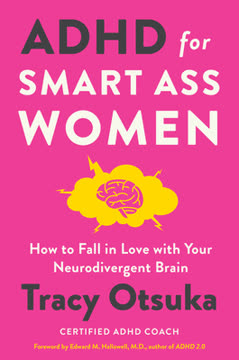
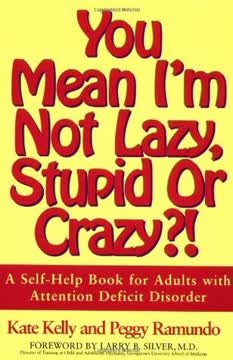
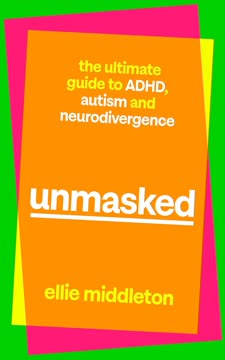
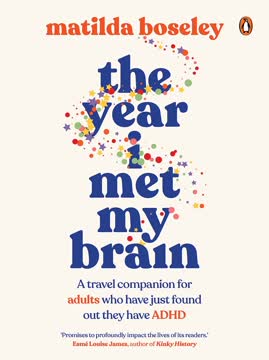



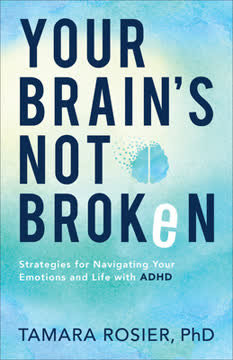
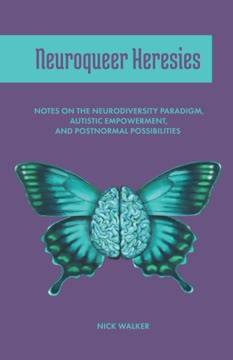
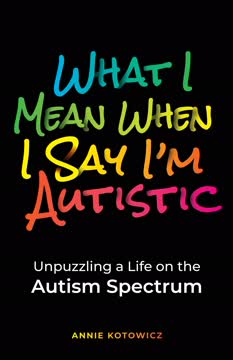
Download PDF
Download EPUB
.epub digital book format is ideal for reading ebooks on phones, tablets, and e-readers.
